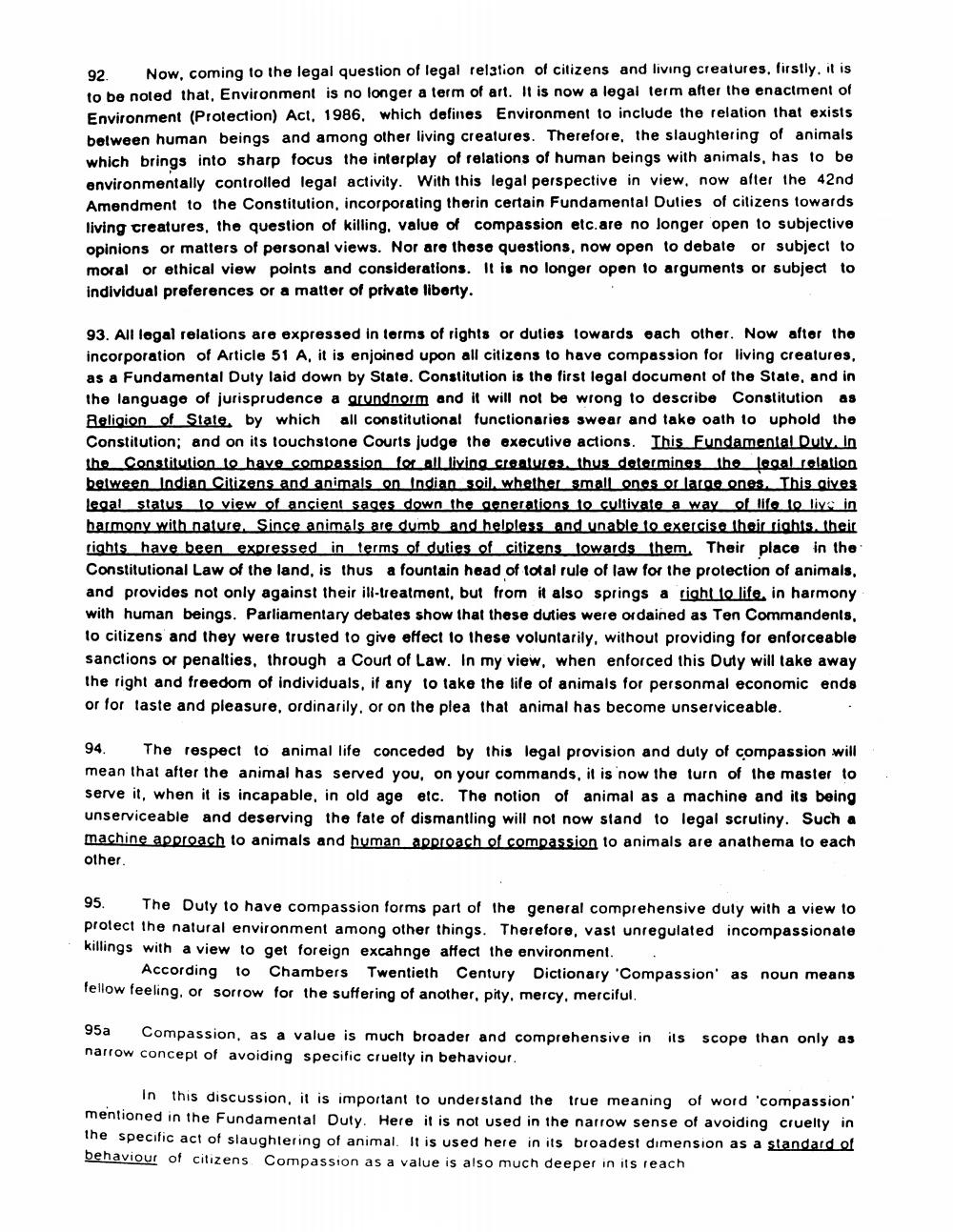________________
92. Now, coming to the legal question of legal relation of citizens and living creatures, firstly, it is to be noted that, Environment is no longer a term of art. It is now a legal term after the enactment of Environment (Protection) Act, 1986, which defines Environment to include the relation that exists between human beings and among other living creatures. Therefore, the slaughtering of animals which brings into sharp focus the interplay of relations of human beings with animals, has to be environmentally controlled legal activity. With this legal perspective in view, now after the 42nd Amendment to the Constitution, incorporating therin certain Fundamental Duties of citizens towards living creatures, the question of killing, value of compassion etc. are no longer open to subjective opinions or matters of personal views. Nor are those questions, now open to debate or subject to moral or ethical view points and considerations. It is no longer open to arguments or subject to individual preferences or a matter of privato liberty.
93. All legal relations are expressed in terms of rights or duties towards each other. Now after the incorporation of Article 51 A, it is enjoined upon all citizens to have compassion for living creatures, as a Fundamental Duty laid down by State. Constitution is the first legal document of the State, and in the language of jurisprudence a grundnorm and it will not be wrong to describe Constitution as Religion of State by which all constitutional functionaries swear and take oath to uphold the Constitution; and on its touchstone Courts judge the executive actions. This Fundamental Duty. In the Constitution to have compassion for all living creatures, thus determines the legal relation between Indian Citizens and animals on Indian soil, whether small ones or large ones. This gives legal status to view of ancient sages down the generations to cultivate a way of life to live in harmony with nature. Since animals are dumb and helpless and unable to exercise their rights. their rights have been expressed in terms of duties of citizens towards them. Their place in the Constitutional Law of the land, is thus a fountain head of total rule of law for the protection of animals, and provides not only against their ill-treatment, but from it also springs a right to life, in harmony with human beings. Parliamentary debates show that these duties were ordained as Ten Commandents, to citizens and they were trusted to give effect to these voluntarily, without providing for enforceable sanctions or penalties, through a Court of Law. In my view, when enforced this Duty will take away the right and freedom of individuals, it any to take the life of animals for personmal economic ends or for taste and pleasure, ordinarily, or on the plea that animal has become unserviceable.
94. The respect to animal life conceded by this legal provision and duty of compassion will mean that after the animal has served you, on your commands, it is now the turn of the master to serve it, when it is incapable, in old age etc. The notion of animal as a machine and its being unserviceable and deserving the fate of dismantling will not now stand to legal scrutiny. Such a machine approach to animals and human approach of compassion to animals are anathema to each other.
95. The Duty to have compassion forms part of the general comprehensive duty with a view to protect the natural environment among other things. Therefore, vast unregulated incompassionate killings with a view to get foreign excahnge affect the environment.
According to Chambers Twentieth Century Dictionary 'Compassion as noun means fellow feeling, or sorrow for the suffering of another, pity, mercy, merciful.
95a Compassion, as a value is much broader and comprehensive in narrow concept of avoiding specific cruelty in behaviour.
its scope than only as
In this discussion, it is important to understand the true meaning of word 'compassion' mentioned in the Fundamental Duty. Here it is not used in the narrow sense of avoiding cruelty in the specific act of slaughtering of animal. It is used here in its broadest dimension as a standard of behaviour of citizens Compassion as a value is also much deeper in its reach




